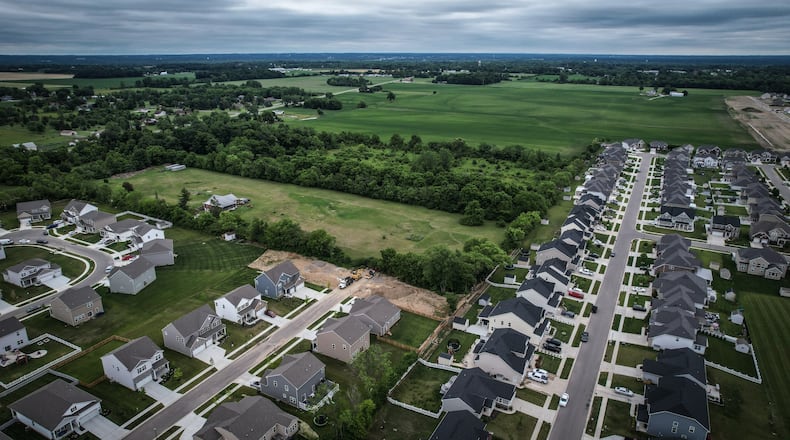Two days later, on May 25, Huber Heights Mayor Jeff Gore’s Facebook page showed the following post: “I have emailed all of Huber Heights city council and informed them that given the makeup of this council, I will not be bringing forth any agenda item related to annexation. This includes the annexation agreement passed by the Bethel Township trustees and the annexation legislation itself.”
The land in question lies immediately northeast of the huge Carriage Trails housing subdivision. The Bethel Twp. trustees and the Bethel Local School District both had opposed the annexation, citing concerns such as traffic and the growing number of students filling the Bethel district’s school buildings, in case the currently vacant land would be developed into new homes.
According to Gore, the proposed moratorium agreement with Bethel Twp. had been in the works for more than a year, with officials from both governments working closely this year to finalize a proposed document.
The only reason the proposed agreement got to this point in the process, Gore said, is because he was under the impression that it would have the support of enough council members to pass the legislation.
Based on conversations between himself and the rest of city council, Gore said he initially believed the annexation agreement was favorable to at least four members. However, the proposal would need five yes votes to be approved by a majority.
It wasn’t until last year, he claimed, that council member Anita Kitchen expressed support of such an agreement. Gore said this led him to believe five members would vote yes and the agreement would pass by a majority vote.
“The whole reason we even got to an annexation agreement on the moratorium was because Anita said if the moratorium was included in the agreement, she would vote yes on the annexation,” Gore said, citing a text message he said he received last year from Kitchen in which she claimed the agreement could be “a compromise I could live with.”
But Kitchen, who began her term on council in January of 2022, said Tuesday she has never been sold on the latest annexation proposal.
“I’m for a moratorium, (but) I am not for us taking over this 260 acres of land,” she said.
Kitchen said she shares Bethel’s concerns about traffic and school overcrowding.
“I have friends who teach in Bethel schools, and they are busting at the seams,” she said. “Huber schools couldn’t handle it either. I just looked at Huber’s grade card rating, and we’re 555 out of 604 schools; obviously our schools have issues and we have no business doing any of this.”
Without Kitchen’s support, Gore said the agreement proposal vote would likely end in a tie if presented to council for a vote.
“We know what happens if they think there’s a tie,” Gore said about members of council, noting that he is in support of the agreement proposal and would vote yes if given the opportunity. “One of them will miss the meetings on purpose so that I can’t break the tie.”
Last year, there were several meetings of Huber Heights council where members were absent on days where key votes were possible.
Last year, after an extended fight, Miami County commissioners reluctantly approved the annexation of these 260.360 acres from the township to Huber Heights, after first denying the move. They did so only after being ordered by the 2nd District Court of Appeals to approve the annexation, which had been sought by the property owners in question. The landowners/petitioners include Gessaman Family Farm LLC; Gary L. Lavy, trustee; Raymond E. and Kriss Haren; and the estate of Charles Stafford.
An attorney for the property owners could not be reached for comment Thursday.
Gore said the city has until June 27 to vote on the annexation, at which time the petition will become null and void, and a subsequent filing would need to be made by the applicant.
Councilman Richard Shaw said he and other members of council have requested “due diligence” steps be completed to demonstrate that the city has the capacity to service the additional land and homes.
Council did approve a services agreement last year asserting the city’s ability to do so, but Shaw said more information is needed regarding the breakdown of finances.
“We were waiting on the information about what would come from the (proposed Tax Increment Financing) and what the revenue would amount to ... none of that information was ever presented to council,” Shaw said, also highlighting his concern that voters in May rejected the renewal of a 10-year, 0.25% earned income tax levy that has funded fire, police, and emergency medical services since its initial passage in 2014.
Shaw said he feels residents deserve that information and that a vote should be held.
“I believe the residents of Bethel Twp. and Huber Heights deserve a vote and deserve to have either closure on this or to know what’s going to happen next,” he said. “I don’t feel the residents are getting that from the mayor and city administration.”
The Huber Heights City Council has been in an ongoing state of turmoil in recent years, a tension that’s been highlighted through its inability to select and hire a city manager. The city has operated without a permanent city manager since March 2021, and the drawn out replacement process, which was paused for six months and officially restarted in January, has included accusations of obstruction, bias, and political ploys amongst members of council.
About the Author


